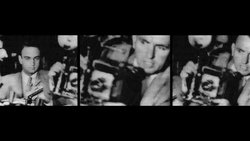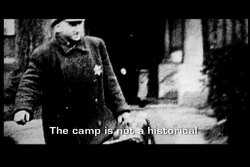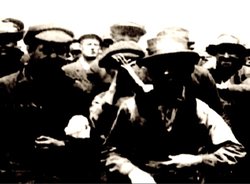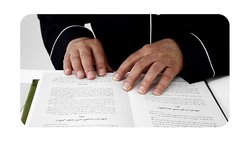
GUEST ARTIST | PETER FREUND

PETER FREUND
Peter Freund is usually working on something else. He writes to avoid making art and makes art to avoid writing. He is a sometimes curator so as to avoid his own work, but usually that inspires him to write or make art. His projects have routinely used appropriation as an instrument to cut conceptual holes in the fabric of historical memory and related enigmas. He is co-founder of the Barcelona-based artist collective, Adversorecto, which deploys the idea of «retraction» as a conceit and near-methodology for producing individual and collaborative works through an aesthetic of algorithmic reduction. www.peterfreund.art
20 OUT / OCT 16H00 BATALHA CENTRO DE CINEMA 80’
APPROPRIATION: THE PRODUCTIVE
FAILURE TO RE-ENACT
Peter Freund apresentará uma masterclass sobre o seu trabalho numa breve declaração de abertura antes das projeções programadas e em breves introduções antes de cada filme. O tema geral desta masterclass dispersa será o uso da apropriação (imagem, texto, som) como meio artístico para investigar os temas fugidios do tempo e da memória histórica através do fracasso decisivo, mas produtivo, da reconstituição. Haverá um debate aberto após as projeções.
REGISTRATION FORM: LINK
Masterclass in partnership with the Instituto de Filosofia - Universidade do Porto

THE END OF AN ERROR
2014 | USA | DOC/EXP | 10’
The 1954 Army-McCarthy hearings marked the unmistakable beginning of the end of the «Red Scare» period in the United States. Produced for the sixtieth anniversary of the televised hearings, «The End of an Error» refashions the archival record to take a side-ways look at this important historical event. By fictionalizing the story as a history lesson narrated from contemporary Iran (voice in Farsi with English subtitles), this three-projection video installation, presented here in single channel format, re-positions the expected narrative center and reports the demise of the «communist threat» from the vantage point of what has since emerged in the American imagination as the «terrorist state». Ultimately, the piece asks: From what position do we remember a triumph in history?

CAMP
2011 | USA | FILM/ESSAY | 7’
Crossing the traditions of collage film and film essay, «Camp» overlaps campy aesthetics and the figure of the concentration camp. This ostensibly accidental and undeniably problematic pun develops into a conceptual framework made out of choice excerpts from Busby Berkeley’s 1943 campy masterpiece, «The Gang’s All Here» and documentary material used in the 1945-46 Nuremberg trials. Beneath the visual track, two narrators, one in Arabic and the other in Mandarin, reflect on the political and theatrical meanings of «camp» in exploring the role of fantasy in traumatic historical memory and the ethical root of flamboyant enjoyment.

HISTORY LESSON
2010/2020 | USA/SPAIN | DOC/EXP | 7’
The image of the communist meets the commutation test. A recited self-description of the Wobblies (the Industrial Workers of the World, or IWW) is continuously recalibrated on the fly in relation to a piece of early twentieth-century film that documents workers strolling the grounds of a factory. The footage is first presented on screen, then projected back onto the surfaces of an abandoned factory space. «History Lesson» raises the question of synchronization in the image-narration montage and obliquely in the relationship between the contemporary image of the «working class», non-labor time, and an emancipatory politics.

ERASED MOSSADEGH
2015 | USA | DOC/EXP | 11’
This «subtractive commemoration» of the 1953 U.S.-orchestrated coup d'état in Iran utilizes false testimony as a medium to explore the nature of historical memory. Ousted Premier Mohammed Mossadegh, played by Nasser Rahmaninejad, alternately delivers three inconsistent accounts of the coup drawn directly from the language of the Shah’s memoirs, the CIA planning documents for the coup, and a celebrated leftist’s harangue against U.S. imperialism. Not a single word of Mossadegh’s is deployed. Woven together as a single testimonial given by the wandering protagonist, the texts decisively fail to add up. In light of today’s historical revisionism, the failure begins to reflect on the uses of testimony and documentation to obscure not only the factual record but also, more radically, the inescapably fictive dimension of all historical memory.